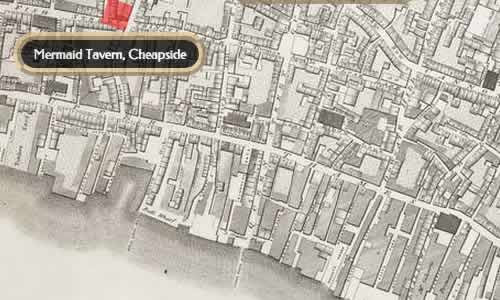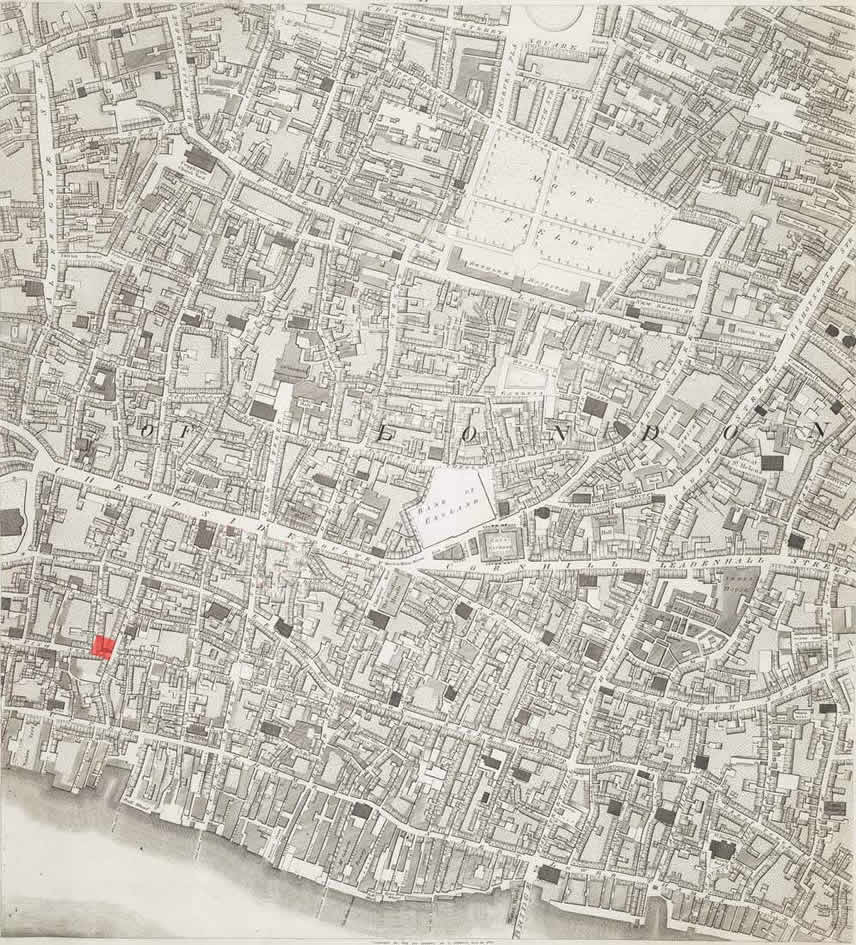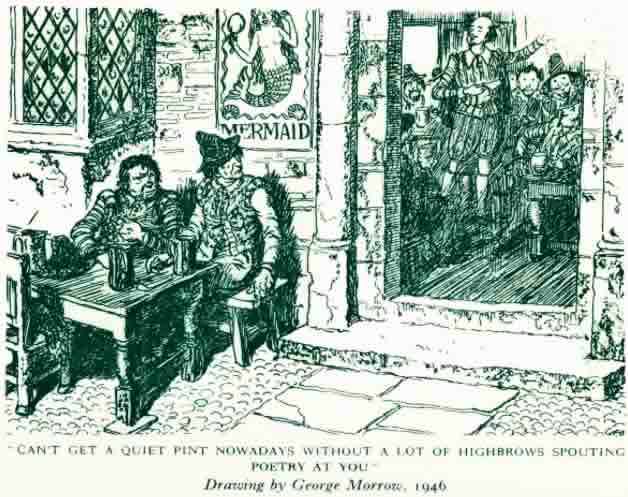January 1818: The Mermaid Tavern; Eagles rather than Owls; Toward Vastness & the Unobtrusive Subject
Mermaid Tavern, Cheapside, London


Where Keats, aged 22, has a drink sometime toward the end of January. At this time,
in a kind
of dialogical exchange of poems with his very good friend and fellow poet John Hamilton Reynolds, Keats writes an occasional poem about
the legendary Mermaid Tavern, noting that famous poets dead and gone
(like Beaumont, Jonson, Fletcher, and perhaps Shakespeare) also imbibed there, meeting as a
kind of drinking club (known as The Friday Street Club or Mermaid Club). The original
tavern
is destroyed in the Great Fire of 1666, and probably had entrances on both Friday
and Bread
streets. Keats may have spent the evening with two Horaces—Smith and Twiss—though an account of the night is unclear.* January
1818 is one of Keats’s most social months, and he sees most of his closest friends
and
associates during the month. Early 1818 can also be seen as a time when Keats’s thinking
about
the kind of poetry he wants to write (and the kind of poet he hopes to become) gathers
some
momentum.
As in much of his earlier poetry, Keats seeks association with or reference to other famous poets of the past, though this poem—Lines on the Mermaid Tavern—is not so striving or pandering as some of his earlier work, in poetry that constantly, and sometimes embarrassingly, desires association with great poets in the hope of becoming one: maybe something will rub off if he simply invokes them enough. That is, Keats’s early poetry often features a sense of hanging readiness. Fortunately, this later poem, while expressing some nostalgia, at least points to what kind of poetry he favors—as well as the community politics of free-thinking and Englishness, which Keats feels has been lost. In this way, the poem contains a kind of sideways political comment about his own times.
Shortly after composing Lines on the Mermaid Tavern, Keats repeats this lament of the loss of old times and old values more forcefully in another poem, Robin Hood. The poem signals what he sees as the repressive and materialistic nature of his own era relative to the spirit of Robin Hood’s time. The poem, with a little romantic propping, doubts that those olden times and values of true brotherhood and equality can be revived. Nonetheless, Keats’s two poems raise a crucial question: If the spirit of those old times is irretrievable, what kind of poetry will he, Keats, on his own, outside of any living brotherhood, be able to write? Keats will think this through in 1818. That Keats decides to publish both of the poems in his final and remarkable 1820 volume suggests they carry some importance for him; Robin Hood is perhaps the most openly political poem in the volume.
The Mermaid Tavern poem, though possessing modest poetic merit (remembering that Keats
writes
it in the more informal context of a dialogue with Reynolds), nonetheless has some interest that spins off from the kind of loss
described above. It subtly directs us to what Keats begins to reject in poetry and
what he
aims to embrace—and emulate: poetry that expresses or represents unobtrusive beauty
without an
ostensible, petty, or overbearing message. Keats, obviously self-directing his comments,
outlines the need for poetry that carries an ego-less voice and expresses itself in
a natural
style—unaffected, uncontaminated,
and immersed unobtrusively within the subject.
Unself-proclaiming poetry, we might call it. Again, toward the end of 1818 and into
1819,
these characteristics begin to appear in his poetry—balanced and confident—and these
will
constitute the period of his most remarkable poetry. From within his time, he will
attempt to
write poetry outside of his time. The brotherhood that Keats will try to join will
be via the
conversation his greatest poetry makes with other like-minded artists—then, now, and
in the
future.
To Reynolds on 3 February, Keats musters a
declarative tone. He condemns poetry that has a palpable design upon us.
Poetry,
he argues, should be great & unobtrusive, a thing which enters into
one’s soul, and does not startle it or amaze it with itself but with its subject.—How
beautiful are the retired flowers! how they would lose their beauty were they to throng
into
the highway crying out, ’admire me I am a violet! dote upon me I am a primrose!’
Keats
writes that he favors the Elizabethan poets over the modern poets; and, strongly sounding
his
independent direction, he writes that he will have no more of Wordsworth or Hunt in
particular.
Our desire should, he writes, be for the old Poets, & Robin Hood,
poetry that is uncontaminated & unobtrusive.
(This is his second use of the word
unobtrusive.
) He then quotes from his Mermaid Tavern poem.**
The 3 February letter to Reynolds does, then,
importantly mark out the direction for and nature of Keats’s progress. He does not
want to
write poetry that governs a mere petty state
; he desires a vast
dominion that
his poetry can overlook: Why should we be owls, when we could be eagles?
The analogy of
a narrow, unmoving, and perhaps huddled perspective—in the dark, no less— vs. a clear,
wide
perspective, suggests an expansion of what Keats wants to survey, or see,
in his
poetry; he wants to fly above the scene and see beyond small-mindedness. He does not
want to
compose affected and self-regarding poetry. Remarkably, the scope of his poetry-to-come
in
fact puts his poetic goals and axioms into practice. Keats’s poetic striving will
thus
minister the universal, rather than the particular.
Keats signs off the 3 February letter to Reynolds as his Coscribbler,
which is fitting since Reynolds is publicly
associated with Keats by Leigh Hunt on 1 December
1816 in The Examiner. Hunt also includes Percy Shelley as a young poet who will thoughtfully return the
scene of poetry to a genuine love of nature. Reynolds (about a year older than Keats)
had also
reviewed Keats’s first volume of poetry in March 1817 in The
Champion, and they see much of each other during this period. No doubt they spend
much time discussing poetry.
*Twiss is a minor wit, dramatist, raconteur, writer, and, in 1820, elected member of parliament for Wootton Bassett; Smith is a poet, stockbroker, and, later, novelist—and part of the Hunt-Shelley circle.
**Keats transcribes the mermaid poem a number of times, including in a letter of 30
January to his brothers, in which, via Smith’s account of an evening with Twiss, some
fun is poked at Twiss for spouting
extempore verses when in fact he had written them earlier. Keats notes that a couple
of his friends are impressed with his poem, including Reynolds.


